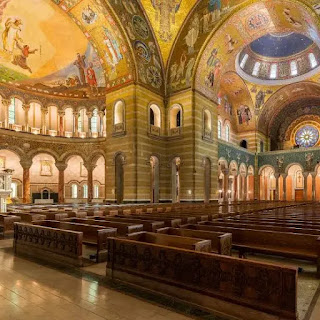Temptation Episode in Murder in the Cathedral
The Morality play follows the medieval literary tradition of allegory. In the temptation episode Eliot follows the broad structure of the Morality but he differs in the details. He does not use the traditional figures and he does not give his figures any name; he calls them tempters. He makes no use of traditional pattern of conflict between the forces of good and evil. The temptation episode stresses the importance of self knowledge which enables Becket to grasp the true conception and significance of martyrdom-‘the design of God’ and the loss of will in the will of God’.

The next stage is martyrdom. The first three temptations are material- Pleasure, Power (chancellorship) and Power (alliance with the Barons). The First Tempter is, in fact, no other than the natural sensual man who lives in everybody and who loves pleasure, athletics, music, good company, luxurious life, gaiety and romance. He naturally reminds Becket of the past, which the latter presumably enjoyed as a younger man. Now if he reconciles with the King he should again allow his clergy to relax in mirth and sportfulness. But Thomas ignores him and dismisses him telling “You come twenty years too late” meaning that such temptations he has really buried in himself long ago.
Then the Second Tempter comes to tempt Thomas of secular power. He blames Becket for having resigned the Chancellorship on becoming Archbishop. He advises Thomas to give up the pretence of priestly power for the power and glory of the Crown. It was no good to be a self-bound servant of the powerless Pope or like an old stag circled with hounds. “Power obtained grows to glory, life lasting, a permanent possession”, says the Second. Tempter. But the Archbishop refuses to forget and forego his celestial duty for the political power.
“To set down the great, protect the poor,
Beneath the throne of God can man do more?”
The Third Tempter, who is political, seeks to seduce Becket to have a political unity with the Barons and a chance to oppose the King -a happy coalition of intelligent interests. This Tempter enters and confesses that he is no courtier or intriguer but a plain speaking “country-keeping lord who minds his own business” (41). He urges him to throw his lot with the barons because such a coalition would strengthen the hands of the barons. But Becket quickly discharges this temptation too:
“If the Archbishop cannot trust the Throne,
He has good cause to trust none but God alone.”
The fourth temptation is spiritual; it is a shrewd form of pride and power closely related to a craving for the perpetual glory of martyrdom. Mathiessen calls it a temptation to the proud mind to become so confident in its wisdom that it seeks a martyr’s crown as its reward. It is once again power, the proud and therefore sinful consciousness of holding spiritual power. The fourth temptation is a cruel assault, and Becket stands stunned by the sudden revelation:
“I have thought of these things.”
But even as he reels, he rallies, and then comes the ‘No!” the ‘Everlasting No’ and the temptation episode becomes a dramatic ritual of purification.
The temptation episode is the dramatization of the experience of self knowledge. Eliot’s treatment is more psychological than that in the Morality because the force of evil has been made an intimate part of the career of Becket. This treatment also reveals the earlier stages of his life which have not been dramatized in the play. The temptations not only explain the different stages of Becket’s life but also go deeper and deeper into his character till the subtle vice of doing ‘the right deed for wrong reason’ is fully exposed.